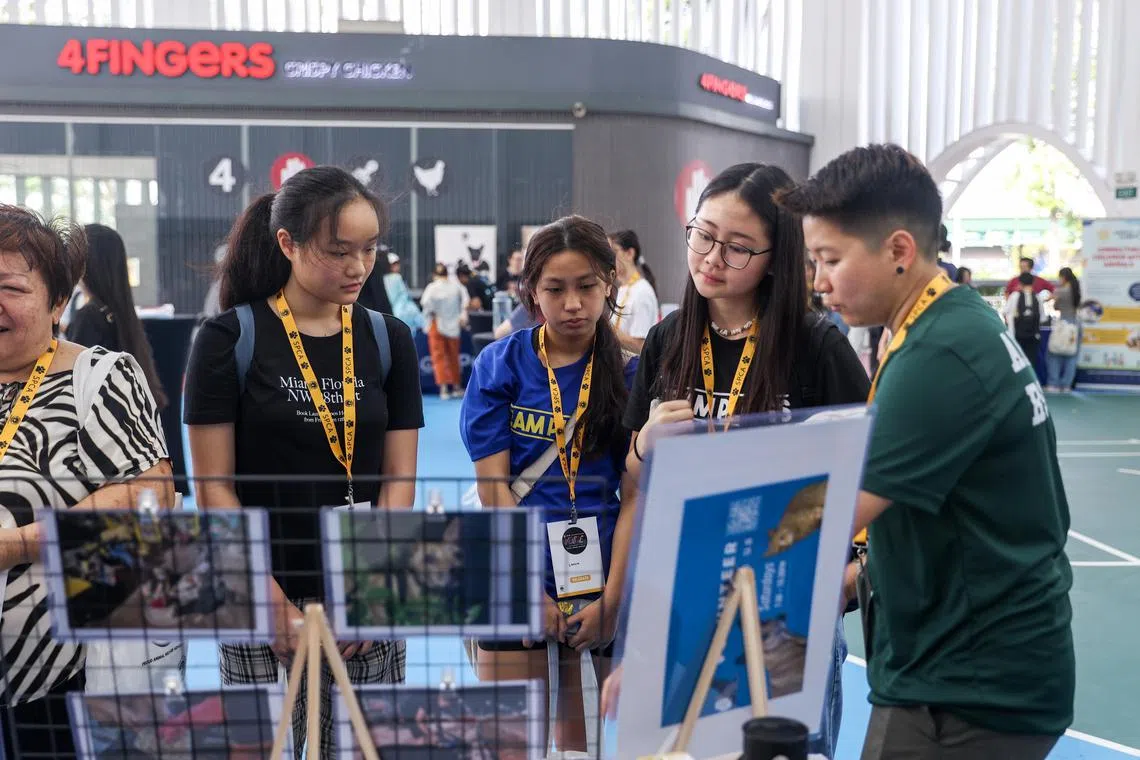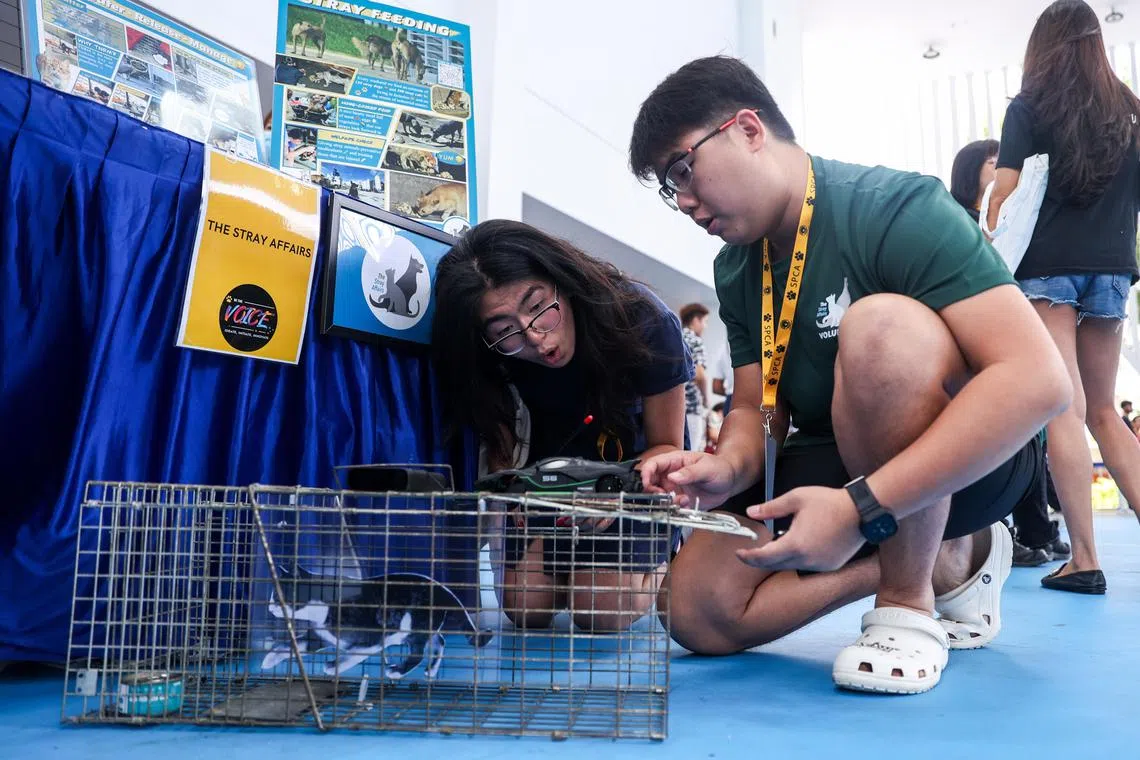Battling crimes against animals is a marathon, not a sprint: SPCA executive director
Sign up now: Get ST's newsletters delivered to your inbox

(From left) SPCA executive director Aarthi Sankar, MP for the Nee Soon GRC Louis Ng and lawyer Sadhana Rai, who heads the representation department at Pro Bono SG during SPCA's inaugural conference.
PHOTO: LIANHE ZAOBAO
SINGAPORE - Investigations into crimes against animals usually take a long time because the victims involved are voiceless and the acts of violence often take place behind closed doors.
On top of that, the authorities have a manpower shortage for investigation and enforcement.
These are some reasons why battling crimes against animals such as abuse, neglect and abandonment “is a marathon and not a sprint”, said SPCA executive director Aarthi Sankar.
The issues were discussed by a panel on June 20 at the Society for the Prevention of Cruelty to Animals’ (SPCA) inaugural conference, called Voices In Compassion and Empathy (Voice).
The conference was organised amid a 12-year peak in animal cruelty and welfare cases in Singapore.
There was a 79 per cent increase in reported cases
SPCA, in a report on Jan 31, said it investigated a total of 915 cases in 2023. This is up from 511 in 2022.
Senior Minister of State for National Development Tan Kiat How said on June 20 in his opening address at the three-day conference that it requires many stakeholders “to come together to work on those issues”.
“It’s not simple or straightforward for many of those issues, because firstly, (it) is about the society – how members of society value, treat and respect animals... We have people who decide to buy or to adopt a pet and those decisions are shaped by their beliefs, their value systems and also society’s expectations,” he said.
The conference, held at Nee Soon East Community Club, brought together more than 20 local and global experts in animal welfare. They included representatives from the Royal Society for the Prevention of Cruelty to Animals (RSPCA) UK, RSPCA Australia, Taiwan SPCA, Ayesha Chundrigar Foundation Animal Rescue of Pakistan and Thailand’s Soi Dog Foundation.
During the panel discussion on June 20 – moderated by Ms Aarthi – lawyer Sadhana Rai, who heads the representation department at Pro Bono SG, a charity that provides free legal assistance, said issues related to evidence in animal abuse cases come up because animals do not actually show signs of abuse until very late, and they hide pain well.
“When an animal did come in (to the vet) and there was (an) allegation of abuse, sometimes the animal had deteriorated such that it was very hard to see if it was the result of some kind of human abuse or the natural deterioration of the animal,” she said.
Despite these “fundamental issues”, the panel agreed that over the years, advocacy for and tireless pursuit of justice for animals in Singapore have led to stronger animal protection laws and stronger enforcement of those laws.

Young volunteers at SPCA’s inaugural Voice conference held at Nee Soon East CC on June 20.
PHOTO: LIANHE ZAOBAO
The panel also said it was important for people to see stories like The Straits Times’ report
“They were not documenting puppies properly, some DNA certificates were not accurate. So for it to actually have been uncovered and then to have been reported reflected an increasing openness in finding what the weaknesses are – to me, that’s important as well,” Ms Rai said.
Of the 19 farms flagged, two are currently under review for potential prosecution under the Animals and Birds Act. If found guilty by the courts, offenders could be fined up to $10,000, jailed for up to 12 months, or both.
Mr Louis Ng, an MP for Nee Soon GRC, who was the other panellist, added that Singaporeans are “brand-conscious”, which is why they continue to buy pedigree pets, and until that stops, the breeding will continue. A long-time social and animal advocate, Mr Ng said he hoped to bring up the issues of animal welfare legislation in the next Parliament sitting in July.
“(It is) not just the Government coming together with different ministries to look at the legislative review, but how members of the public and NGOs can come together to look at the review as well. So the debate continues on many issues – (such as) debarking, convenient euthanasia and declawing – to get on legislation in terms of the penalties involved,” he said.
Many of the issues that he fought for took two years on average to see fruition. “It’s really for the long haul,” Mr Ng said. “It is not just what is happening in Parliament, but outside. We see so many people here today because of the increased awareness of this issue.”
To empower young people interested in implementing impactful animal welfare projects, SPCA launched its first Animal Advocacy Grant at the conference.

Mr Daryl Mah, 25, a volunteer with The Stray Affairs, explaining about the trapping mechanism he invented to help rescue stray cats.
PHOTO: LIANHE ZAOBAO
The grant will provide seed funding of up to $1,000 to each successful group to encourage young people between the ages of 15 and 35 to take ownership of animal welfare issues. It also aims to foster in them a sense of responsibility and commitment to making a positive difference.
SPCA also hopes the grant will promote advocacy for and raise awareness about animal welfare, inspiring broader community involvement and understanding of the importance of animal protection. The funding will provide support to help bring innovative, research-based, or project-oriented ideas to life, ensuring they benefit animals.
Young participants at the conference will take part in experiential activities at SPCA, the Animal Concerns Research and Education Society, the Animal and Veterinary Service’s Centre for Animal Rehabilitation and Canopy Veterinary Centre on the final day of the conference before they make their pitches for the grant.
Up to 10 groups will be awarded the grant.



